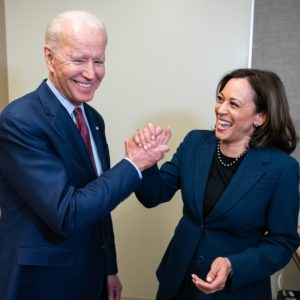President Joe Biden has shown a greater commitment to diversity, equity, and inclusion in a few short weeks than perhaps any president before him. It may seem like a provocative or exaggerated statement, but the fact is, no president has ever centered so much of their Day One agenda, in policy and practice, at every level on addressing the deepest inequities in our society. Indeed, if Biden continues on this trajectory, his could be one of the most consequential presidencies in American history.
Even before taking office, Biden centered gender and racial equity in his most consequential decisions, nominating Kamala Harris as the first Black, Indian female vice president and selecting the most diverse group of nominees for the presidential cabinet in American history. That alone might secure his place among the most important presidencies. But with virtually all of his first confirmed nominees history was also made – Avril Haines as the first woman Director of National Intelligence, Lloyd Austin as the first black Secretary of Defense, and Janet Yellen as the first woman to lead the Treasury. Many more designees will similarly break extraordinary ground once confirmed: Deb Haaland, the first Native person to serve in a cabinet, Pete Buttigieg as the first openly gay cabinet secretary, just to name a few. And it’s not just at the cabinet level. Throughout his administration more women and underrepresented minorities are getting appointed, surpassing previous administrations in sheer representation. Biden is transforming the leadership of the entire federal government and sending a clear message to America and the world that under his leadership, all Americans will be finally be represented.
In his appointments, Biden tackles some of our longest-standing injustices. Native communities have never had a real voice in the federal government, women have been vastly underrepresented, people of color have never held many of our nation’s most important leadership roles, and LGBT people do not have the full and equal rights other Americans enjoy. Biden understands how important representation is to the Americans who elected him, but also to accomplishing his exceptionally difficult and complex agenda. The diverse voices in the cabinet and federal leadership bring critical perspectives that have been excluded from public policy for too long. With this diverse team, the president will hear perspectives on American life that have never been central to considerations of policy and practice. He also, importantly, shows White male leaders everywhere how to use their positions of power and privilege to benefit others. It’s a master class on breaking White supremacy led by a White man. Let’s hope CEOs, world leaders, and White men everywhere follow that example.
As consequential as this all is, in just two weeks the president has also centered equity in nearly every executive order. He immediately repealed Trump-era policies that sought to enforce White supremacy; throwing out the horrific 1776 Commission report, reversing the Muslim travel ban, reversing the ban on transgender people serving in the military, and reversing the Trump-era ban on diversity training for federal contractors. But beyond repealing destructive and racist Trump policies, he’s already making good on commitments to advance racial justice in new and important ways. He has ordered all government agencies to center their policies on equity. He ended the use of private contractors to manage federal prisons and signed orders focused on addressing housing discrimination and discrimination against Asian Americans connected to the COVID-19 crisis. His entire COVID-19 response is rooted in health equity. His economic and environmental policies are pointed toward a more inclusive recovery. The list goes on and on.
In a Tweet on January 26, Biden wrote, “The fact is systemic racism touches every facet of American life, and everyone – no matter your race or ethnicity- benefits when we build a more equitable America.” Indeed.
Presidents, both Democrat and Republican have certainly made choices and decisions that moved our nation closer to the full realization of its’ ideals. From Abraham Lincoln issuing the Emancipation Proclamation on January 1, 1863, to Lyndon Johnson signing the Civil Rights Act in 1964 and the Voting Rights Acts in 1965, and more recently of course the history-making presidency of Barack Obama and his appointments and policy, many presidents have worked tirelessly to form a government of the people, by the people, and for the people. Bill Clinton was the first to make a woman press secretary (DeeDee Myers) and George W. Bush appointed both the first Black male (Colin Powell) and Black female Secretaries of State (Condolezza Rice). Many more examples abound. But what makes Biden’s nescient presidency so important is the centrality of diversity and inclusion to his every action. It’s the totality of his work in so short a time that astonishes. We can’t know how consequential to history his actions will be, and ultimately his ability to pass durable legislative reform will be even more important. Passing comprehensive immigration reform, police reform, paid family leave and federal LBGT protections are imperative for lasting change.
The Trump presidency was a protracted war against a diversifying America. He amplified misogyny and racism in endless appalling ways, from the first day of his presidency to his last. But at a time when Most Americans say they view diversity as “very good for the country,” Biden is doing more than just righting the many wrongs of his predecessor. He is working from the first day to destroy the racist policies that hold us all back and is building toward a vision of a better America. One where all people are not just created equal, but treated as such. It’s about time.

